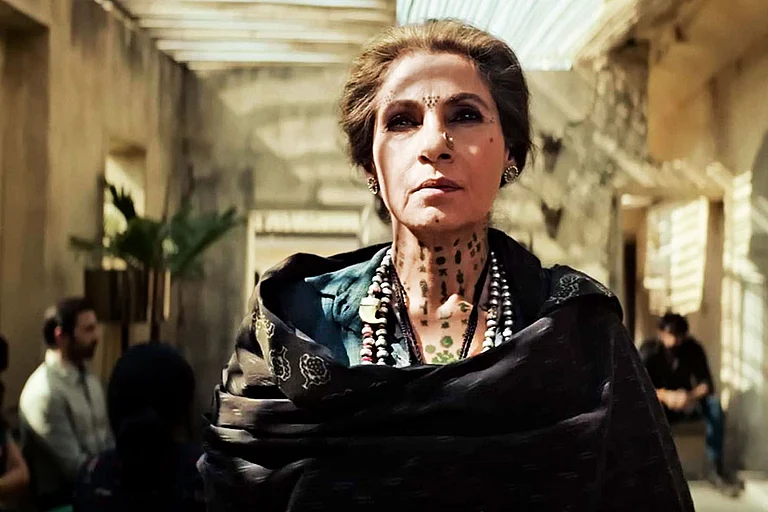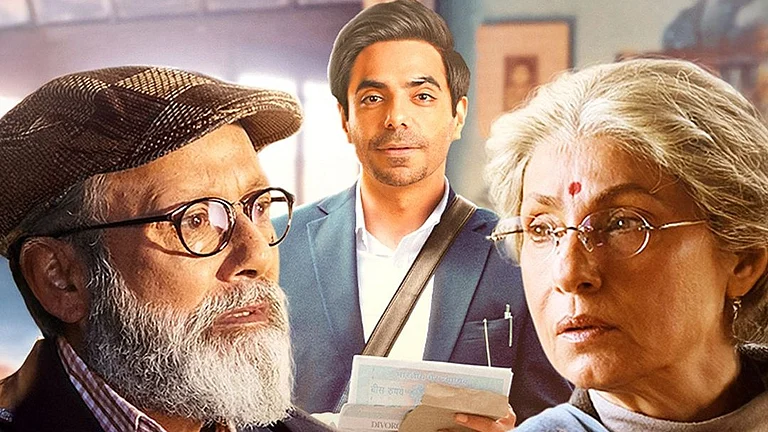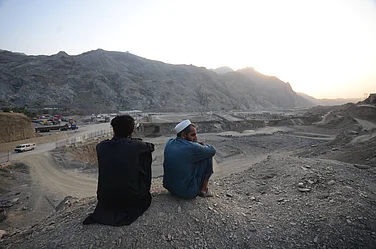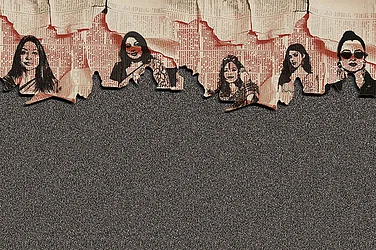For the controversy over the visit of Sonia Gandhi to the Oxford Centre, please see:Arun Jaitley's Press Statement, Polscape,and Full PTI Coverage
Lord Howe, Dr Nizami, Excellencies, Ladies and Gentlemen
I must straightaway declare my partiality.
I love that other place where I first met my husband thirty-five years ago and where his grandfather, India’sfirst Prime Minister, took his Tripos. But Oxford also has a claim on my loyalty. My mother-in-law, IndiraGandhi, whose portrait I presented to Somerville College this morning, went up to Oxford during 1937-39.
Oxford has made notable contributions not only to the spread of the wisdom of the western world, but alsoto the understanding of the civilisations of the East. For the people of India, Oxford will always be linkedwith the names of Monier-Williams, Max Mueller and S. Radhakrishnan, who enabled the world to understand theprofundity and eternal relevance of India’s ancient thought.
A number of noted Indian political leaders, historians, economists, sociologists and scientists have beentrained at this great citadel of learning. And it is a matter of pride that a scholar from our state of UttarPradesh is the Director of this Centre.
Rabindranath Tagore once described Oxford as a symbol of the undying spirit of man. That spirit isreflected in the activities of this Centre whose proclaimed objective is to increase the mutual knowledge andunderstanding between the Islamic and the western world.
Among the distinguished statesmen who have preceded me here, several have been notable Islamic scholars. Icannot lay claim to scholarship but I take the expression "Islamic World" more to be a political figure ofspeech than a term with clear and precise geographical boundaries.
There are more Muslims in India, than in any other country save Indonesia. Similarly, there are more Hindusin India than in any other country. There are also more Christians in India than in many countries recognisedas Christian. But India is not a Hindu country or a Muslim country or a Christian country. It belongs to allof them and the millions of followers of other religions as well.
Over the past thirteen centuries, Islam has influenced Indian civilisation in its various facets. The worksof Islamic historians like Al-Biruni still remain standard references on our country. The great achievementsof Indian astronomers and mathematicians in the middle of the first millennium were transmitted by Islamicscholars to the rest of the world.
What would the modern world be without the zero and without the system of numerals-both Indian inventionsthat were propagated by Central Asians and Arabs. Indian art and architecture, literature and poetry,language, music and philosophy, and even textiles and crafts, have all been enriched by Islam.
The eclectic Sufi tradition is an integral part of Indian Islam. The interaction of Sufism with the Bhaktimovement gave rise to several egalitarian and reformist orders. It was Dara Shikoh’s translation of theUpanishads into Persian that served as the basis of the discovery of this treasure by the world atlarge.
India has also had a decisive impact on Islamic thought, and some of the greatest Islamic philosophers,theologians and poets have hailed from the sub-continent. The practice of Islam itself in the sub-continentreflects local influences and represents the synthesis with existing beliefs and values. This also reveals theenormous scope that Islam provides for a variety of spiritual experiences.
Indian literature extolling our composite culture and heritage is vast. I recall particularly the seminalcontributions of four prominent Indians, Swami Vivekananda, Mahatma Gandhi, Jawaharlal Nehru and Maulana Azad.
Maulana Azad is one of the most erudite scholars of Islam in modern times. He was among the closestcolleagues of Mahatma Gandhi and a front-rank leader of the Indian Freedom Movement. In his Presidentialaddress to the plenary session of the Indian National Congress in 1940, he said: I quote
I am a Muslim and profoundly conscious of the fact that I have inherited Islam’s glorious traditions ofthe last thirteen hundred years. I am not prepared to lose even a small part of that legacy….
I am equally proud of the fact that I am an Indian, an essential part of the indivisible unity of Indiannationhood, a vital factor in its total make-up without which its noble edifice will remain incomplete. I cannever give up this sincere claim.
It was India’s historic destiny that its soil should become the destination of many different caravans ofraces, cultures and religions. Even before the dawn of history’s morning, they started their trek into Indiaand the process has continued since
Students of Indian history are certain to remind you that in Maulana Azad’s own lifetime, manyMuslims in India did not think like him and opted for a separate state of their own. But more Muslims remainedin India than those who chose Pakistan.
In recent years some political parties have been proclaiming that India belongs to the majority community.But have no doubt. Although their voices are loud and figure prominently in the media, they are a handful.Secularism is India’s destiny because her people have willed it. The founding fathers of the Indian nationwere men of wisdom and insights. They knew that religion is a vital force in India that should not belegislated away.
As was often the case, Gandhiji, a deeply religious man, said it best: (I quote)
I do not want my house to be walled in on all sides and my windows to be stuffed. I want the cultures ofall lands to blow about my house as freely as possible. But I refuse to be blown off my feet byany.
To say this is not to deny the fact that there have been numerous periods in our history when rulersattempted to spread particular religions with force. But theirs were singularly unproductive times.
The radiant ages of Indian history when the fame of India spread in the world were those ages whentolerance prevailed. Periods of economic expansion were also periods of great spiritual achievements. Andeconomic prosperity and social amity went hand-in-hand-a lesson not without its modern-day relevance.
India is a land of the greatest diversities and infinite varieties. I use the plural advisedly. It is acountry with at least 18 major languages and over 400 important dialects. It is a land that has given rise tofour of the world’s major religions.
As I mentioned earlier, it is home to the world’s second largest Muslim population. It welcomedChristianity long before Europe embraced it. India has always offered refuge to people fleeing from religiouspersecution whether they be Jews or Zoroastrians.
It is a society with over 4000 ethnic communities or castesor endogamous groups. It is a land comprising different ecological and cultural regions each with its owndistinctive history. India is thus a multi-religious, multi-linguistic, multi-ethnic and multi-regionalcivilisation without a parallel. The record of a relatively young Indian nation-state in managing thesebewildering array of diversities, admittedly amidst trials and tribulations, is one ofthe remarkable achievements of contemporary times. Jawaharlal Nehru described India as: I quote
an ancientpalimpsest on which layer upon layer of thought and reverie had been inscribed and yet no succeeding layer hadcompletely hidden or erased what had been written previously….though outwardly there was diversity andinfinite variety among our people, everywhere there was that tremendous impress of oneness, which had held allof us together for ages past, whatever political fate or misfortune had befallen us.
One of the defining principles of contemporary India is Unity in Diversity. But there is something more.India exemplifies a complex Unity through Diversity, a society in which the celebration of diversitystrengthens the bonds of our modern nation. I might add that India’s diversities are not just numerous. Theyare also alive and assertive.
It is India’s multi-layered parliamentary democracy that provides the framework within, which all of ourpeoples’ voices are heard and their aspirations pursued. Democracy has taken firm root in India and hasproved its resilience time and again. It is an instrument both of representation and empowerment. Theflexibility of our Constitution, has helped us accommodate diversities in a peaceful and negotiated manner.
Affirmative action embedded deeply into the fabric of our democracy is giving new hope to the disadvantagedsections of society, not least of which are women. Today, there are over a million of them, electedrepresentatives transforming our countryside.
The creation of new states has kept centrifugal tensions at bay,and the reconfiguration of India’s internal geography, has been an important element in managing itsdiversities, while adhering to the rule of law. Tremendous social ferment is taking place throughout thecountry. This churning does, on occasions, result in conflict.
From the outside, its scale may get magnifiedand it may appear that India is frequently in turmoil. The truth is that, at any given point of time, the vastmajority of our people live in harmony and peace. There is indeed something powerful that gives strength andresilience to our society even as it is subject to varied stresses and strains. And that something issecularism and democracy-two complementary forms of tolerance as the Mexican Nobel Laureate Octavio Paz onceput it.
We are meeting against the background of growing international terrorism and the fall-out of what has cometo be known as 9/11. What is striking and remarkable is that international terrorist networks do not seem tohave a hold on Indian Muslims. That is entirely because our political and social framework accommodatesplurality in substantial measure. All over the world, an impression has been created that Islam and terrorismare inseparable. The fact that there are any number of terrorist organisations whose members subscribe toother religions is conveniently forgotten.
India has been a continuous victim of cross-border terrorism. BothHindus and Muslims have been targeted alike. This is particularly so in our state of Jammu and Kashmir whereit is evident that the terrorists are acting in pursuance of the foreign policy of our neighbour to the west.It would be wrong to think that religion is their motive.
Nevertheless, I should point out that, by thepostures it adopts and the actions it takes, this neighbour provides a ready handle to those who stokecommunal antagonisms within India. There are also religious and political leaders on both sides who feed oneach other’s passions.
Terrorism has no religion. In fact, it is the antithesis of religion, for the essenceof all religions is compassion. A major effort has to be made to enable people to appreciate this truth.Inter-faith dialogue and communication at various levels and in different forums, has to be sustained, to helpimprove mutual understanding.
Religious extremism very often is born out of perceived threats. These threatscan be dealt with only through analysis, debate and engagement. This Centre has an important role to play inthis regard. The new challenge that the world will face in this evolving century, is decentralised terrorismon the part of well-organised political and ethnic groups armed with sophisticated weaponry. Their aim is tocreate panic amongst the largest numbers of innocent men, women and children.
Humankind must urgently move todeal with this menace caused by zealots who deliberately misuse religion. Terror should not be combated withgreater terror. Though no end can justify mindless violence, ultimately the roots of terrorism have to belocated in political, social and economic factors.
Prosperity can breed terrorism as much as poverty can. Aglobalisation process that is seen to be inequitable and destabilising of cultural moorings can triggerterrorist mindsets. A political system that is closed and does not fulfil the aspirations of the people cancreate conditions which encourage dangerous ideologies.
9/11 was a colossal tragedy and all of us reached out spontaneously to America in that moment of grief. Itis regrettable that the world woke up to the threat of terrorism only after the horrific events of that day.Terrorism cannot, and should not, be dealt with in a selective and segmented manner within the framework ofindividual nation-states and their priorities.
Now that all of us are aware of the horrendous consequences ofinternational terrorism, and the threat of weapons of mass destruction, we must sustain a collective campaignagainst them with single-minded focus. This campaign should be framed and implemented on a clear understandingthat terrorism is indivisible, international and is perpetrated not only by non-state actors but also by somegovernments, as an instrument of their state policy.
The approach that says, "the terrorism I face is ofhigher priority than the terrorism you face" is illogical, and has dangerous implications for globalstability and security. Equally grave is the cross-border flow of funds through different channels that helpsupport terrorist organizations. This must be dealt with comprehensively and globally.
It has become fashionable to talk, of an impending "clash of civilisations". The Indian experiencestrongly disproves this approach. The concept of a deep fault line across world religions and its resultinginevitably in conflict, lends itself to mischievous distortions and misrepresentations, both internationallyand within our own societies.
Complex political, social and economic realities cannot be reduced to asimplistic confrontation between religions. All of us need to guard against this. Cherishing and upholdingtolerance at home, it is but natural that India should champion co-existence amongst the nations of the worldas well.
Panchsheel-the five principles of peaceful co-existence derived from the Buddha’s teachingsand given contemporary relevance by Jawaharlal Nehru still holds great meaning. Let me racapitulate what theseprinciples are: mutual respect for each other’s territorial integrity and sovereignty, mutualnon-aggression, mutual non-interference in each other’s internal affairs, equality and mutual benefit andpeaceful coexistence.
Conflict and coexistence cannot be managed by any one single country, howsoever well-meaning and powerful itmay be. There is urgent need to redesign international institutions so that they reflect contemporaryrealities. They must have an effective say in the management of global issues.
The most recent SecurityCouncil resolution on Iraq has given multilateralism a fresh lease of life-and we hope that this will be along enough lease for the UN to be renewed and restructured. Globalization will prove equitable andsustainable only if serious attention is paid to its governance both within and across nations.
The USA is nowthe world’s pre-eminent power in every sense of the term. But the paradox of this power is that it cannotafford to act unilaterally. Many in the United States are impatient with multilateralism, but in today’sinter-dependent world, there is simply no alternative to working in concert and collaboration with each other.We fervently hope that the United States recognizes the desirability and feasibility of multilateralism. Atthe same time, other countries have a responsibility to keep the USA involved and committed to internationalagreements and institutions.
Let me now turn to South Asia, where one-fifth of humanity resides. Our aim is that this region must befree of tensions so that the seven countries can individually and collectively address common economic, socialand ecological problems-and these are present in abundance.
How long can we afford to be prisoners of thepast? The future beckons. We owe it to our own people to chart a new course in a bold and an imaginativemanner. The large and gifted sub-continental diaspora has an important role to play here.
I want to say a fewwords on West Asia, a region with which India has long had an intimate cultural and economic relationship. Werecognise the rights of the Palestinian people to a viable state of their own as well as the right of Israelto live within secure borders. While we condemn all forms of violence and terrorism, we believe that there canbe no lasting peace in West Asia without the legitimate concerns of the Palestinian people being addressedmeaningfully.
Growing economic and strategic cooperation between India and Israel does not make us insensitiveto this reality. We have watched closely the developments relating to Iraq in recent months. As a foundingmember of the UN, India is deeply committed to the principles of its charter. It is our view that the questionof Iraq cannot be dealt with unilaterally. Concepts like "regime change" are fraught with grave dangers.
I would like to say few words about the state of Jammu & Kashmir, where the people voted in the recentelections fearlessly, in spite of heavy odds. These elections are a decisive watershed, because theyre-establish the vitality and durability of our democracy. The world community must appreciate the newexpectations of the people of Jammu & Kashmir for ending of this spiral of terrorist inspired violence andkillings.
























